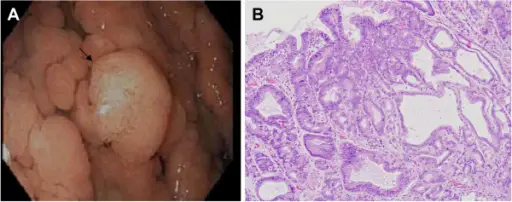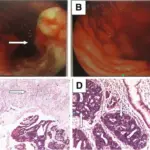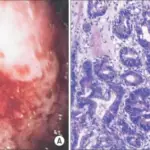Gastric adenomas are neoplastic growths characterized by localized, polypoid proliferations of dysplastic epithelium
What is the Pathology of Gastric Adenoma?
The pathology of gastric adenoma is:
-Etiology: The cause of gastric adenoma is unhealthy diet and lifestyle, including high-salt food, smoking and drinking, are able to induce genotypic and phenotypic transformation of gastric epithelial cells.
-Genes involved: Mutation in E-cadherin.
-Pathogenesis: The sequence of events that lead to gastric adenoma are: it is affected by racial, regional, and environmental factors and that its molecular biological pathogenesis involves genetic and epigenetic alteration and histological differentiation; all this leads to various findings within tumors or tumor heterogeneity, suggesting biologically and/or genetically heterogeneous complexity.
-Histology: The histology associated with gastric adenoma shows benign epithelial tumors.
How does Gastric Adenoma Present?
Patients with gastric adenoma typically males mostly at older age. The symptoms, features, and clinical findings associated with gastric adenoma include weight loss, poor appetites, discomfort, abdominal pain, heartburn, nausea, and vomiting.
How is Gastric Adenoma Diagnosed?
Gastric adenoma is diagnosed by upper gastrointestinal series UGI, ultrasounds, MRIs, CT scans and X-rays, and biopsy.
How is Gastric Adenoma Treated?
Gastric adenoma is treated by resection of tumors by endoscopy.
What is the Prognosis of Gastric Adenoma?
The prognosis of gastric adenoma is fair. They are benign epithelial tumors. While some of them remain adenomas for a long time, others progress to carcinomas. However, long-term outcomes of such cases are not entirely clear.



